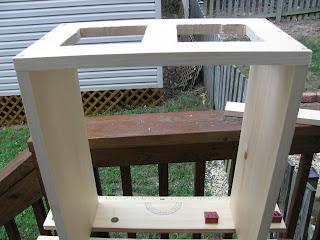Our first "child" joined our family six years ago this month.
Dixie was actually our test child.
She doesn't get as much attention as she used to, but we still try to include her in family activities.
Unfortunately, we have neglected her in other ways.
She has been eating out of this elevated bowl since she was a little puppy.
For a dog her size, the elevation should be a lot taller!
When bending over to to eat, dogs tend to ingest a lot of air with their food...and we all know what excess air leads to! Besides that, having their bowls elevated eases strain on muscles and joints.
In order to determine the proper elevation for your dog, in a standing position,
measure to the shoulder of the dog and subtract 6 inches.
Both my husband and I did an extensive search for the feeder size that we needed.
Richard's jaw dropped at how expensive they were!
$100 dollars or more, plus shipping.
So we took matters into our own hands and drew up a blueprint to a wooden feeder for Dixie!
I am going to share the loose instructions with you, so you can modify them to your own specifications.
We needed a feeder 18 inches high. (24" shoulder height minus 6 inches).
When making this measurement, include any additional height added from the bowls
if they do not lay flush in the wood.
Our bowls were 6" square across the top.
We wanted 2" between the two bowls and around all sides.
We decided a 5" square in the wood would hold the bowl properly
( 1" of the bowl is showing above the wood).
The same calculations can be made using the diameter of a circular bowl.
With all that considered, we needed a 1x10x6 piece of wood.
The top board was 17" across.
We drew the squares for the bowls in the proper location.
Then drilled holes in all corners and in the center of each line to prepare the for the jigsaw.
I have no photos of the jigsawing, but once the holes were removed, the legs were attached.
We let Dixie try it out, and it seemed TOO HIGH for her.
After remeasuring, we didn't account for the height added by the bowls, or the wood with the legs
After remeasuring, we didn't account for the height added by the bowls, or the wood with the legs
(ie. my husband cut the legs to the height we needed)
So my husband took his saw and cut 2" off the bottom to take it to the proper 18" measurement.
He also added a cross support along the bottom.
Dixie is much happier with the feeder now!
I stained the feeder with one coat of Minwax English Chestnut.
And the entire project was about $7!
If you have any questions, please let me know!











We are definitely going to have to make one of these for our furry friend. I can tell that she HATES eating her food so low to the ground.
ReplyDeleteOnce again you guys are awesome.
I followed your link from Just a Girl. This is such a great idea! I've been wanting to make one for a while, but didn't know where to start. My Australian Shepherd thanks you! Now he won't have to lay down to eat his supper.
ReplyDeleteGood Luck! Thanks for stopping by!
ReplyDeleteThanks so much Devon! I stumbled upon your blog when searching for an elevated feeder for my super tall Treeing Walker Coonhound. I too was shocked at how expensive they are and appreciate you sharing the plans that you and your husband developed. Can't wait to make this for my little one. Happy Mother's Day and thank you again!
ReplyDeleteSimply respecting your work and considering how you dealt with this web journal so well. It's remarkable to the point that I can't stand to not experience this significant data at whatever point I surf the web! Raised house plans
ReplyDelete